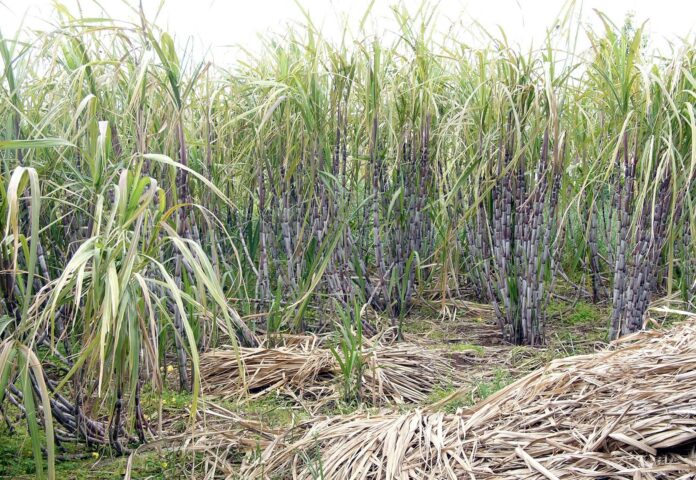By Waiswa Michael Baluye
Sugarcane farming in Uganda has become a significant agricultural activity, with both direct and indirect impacts on the economy, especially in rural areas where many farmers depend on it for their livelihood.
The process begins with the planting of sugarcane seedlings, which take about 12 to 18 months to mature. The crop is handy and grows well in Uganda’s tropical climate, making it suitable for large-scale farming. Many smallholder farmers engage in sugarcane cultivation, either as outgrowers contracted by larger sugar mills or as independent farmers.
These farmers face challenges such as access to quality seedlings, irrigation, and modern farming techniques. Sugarcane requires substantial land, and while land is often passed down through families, the increasing demand for agricultural land and competing interests from large-scale agribusiness can create pressure on local farmers.
Once the sugarcane is harvested, it is sent to local sugar mills for processing. Uganda has several sugar mills such as those in Lugazi, Kakira, and Kinyara where the cane is crushed to extract juice, which is then refined into sugar.The processing facilities also produce byproducts like molasses and bagasse, which can be used for generating power or making alcohol, adding value to the agricultural output.
Many smallholder farmers participate in contract farming arrangements with sugar mills, which offer a guaranteed market for their cane in exchange for adhering to certain farming practices. While this provides farmers with a stable income, it also exposes them to risks, such as fluctuating sugar prices and processing delays.
The sugar mills play a crucial role in the value chain, creating jobs in both sugar production and refining. The expansion of sugar mills and processing capacity boosts the local economy, offering employment and stimulating the growth of supporting industries.
The economic impact of sugarcane farming in Uganda can be seen in several ways. For many smallholder farmers, sugarcane farming is one of the most reliable sources of income. The crop provides a steady cash flow, particularly when other crops may not perform well due to weather or market conditions.
Sugarcane farming also creates jobs, not only in the fields but also in the sugar mills, logistics, and distribution networks, contributing to poverty reduction in rural areas. Additionally, the establishment of sugar mills and the transportation network for getting sugarcane to these mills leads to infrastructure improvements, including better roads, transport systems, and access to markets for other crops.
In some regions, electricity from bagasse power generation has supported local grids, improving the overall energy supply. Through the sugar processing companies, farmers often gain access to inputs like fertilizers, pesticides, and modern farming tools, which can increase productivity. Some sugar mills also offer credit facilities to farmers, enabling them to expand their operations.
However, sugarcane farmers in Uganda face challenges, such as climate change, which can lead to droughts or floods, severely affecting yields. As more people seek land for sugarcane farming, issues related to land ownership and fragmentation become prominent. This can limit access to land for new farmers and affect the sustainability of sugarcane farming. Market access and pricing issues also remain a concern.
While there are guaranteed markets for outgrowers, sugar prices in Uganda are influenced by global sugar market trends. Farmers often face delays in payment, poor price negotiations, and competition from cheaper imports. Additionally, large-scale sugarcane production can lead to environmental problems like soil degradation, deforestation, and water scarcity if not managed sustainably. The use of chemical fertilizers and pesticides can also harm the environment and nearby communities.
The Ugandan government has recognized the importance of the sugar industry for rural development and the national economy. Efforts to support sugarcane farming include investments in infrastructure, such as roads and irrigation systems. Policy frameworks have been put in place to regulate the sugar industry and ensure fair trading practices. However, there are ongoing challenges in enforcing these policies effectively.
Looking ahead, the demand for sugar in Uganda is expected to increase as the population grows and the middle class expands. This creates potential for expanded sugarcane farming and greater economic returns for farmers.
Some farmers are diversifying into sugarcane-based products, such as ethanol production and organic fertilizer, to increase profitability and sustainability. Additionally, there is a growing recognition of the need to address environmental concerns by adopting more sustainable farming practices and improving water and land management in sugarcane farming.
Sugarcane farming has a profound impact on Uganda’s rural economy, providing income, employment, and infrastructure development. However, challenges such as climate change, market volatility, and environmental sustainability need to be addressed to ensure that the sector remains a viable and profitable source of livelihood for Ugandan farmers.
With proper support and sustainable practices, sugarcane farming has the potential to contribute even more significantly to Uganda’s economic growth in the future.
The writer is the Coordinator of the Office of National Chairperson NRM



